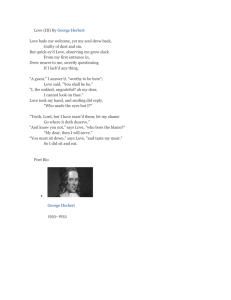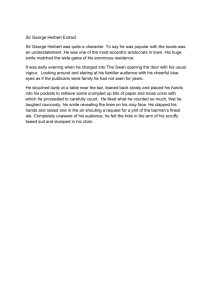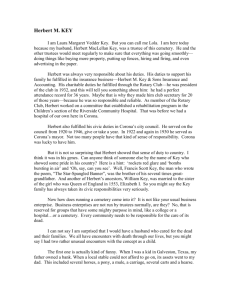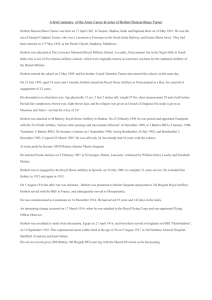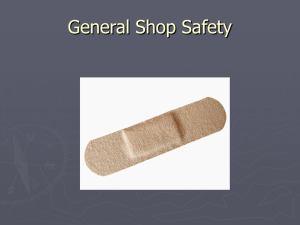TopBike Prepared by Chris Procter Introduction Herbert owns and
advertisement
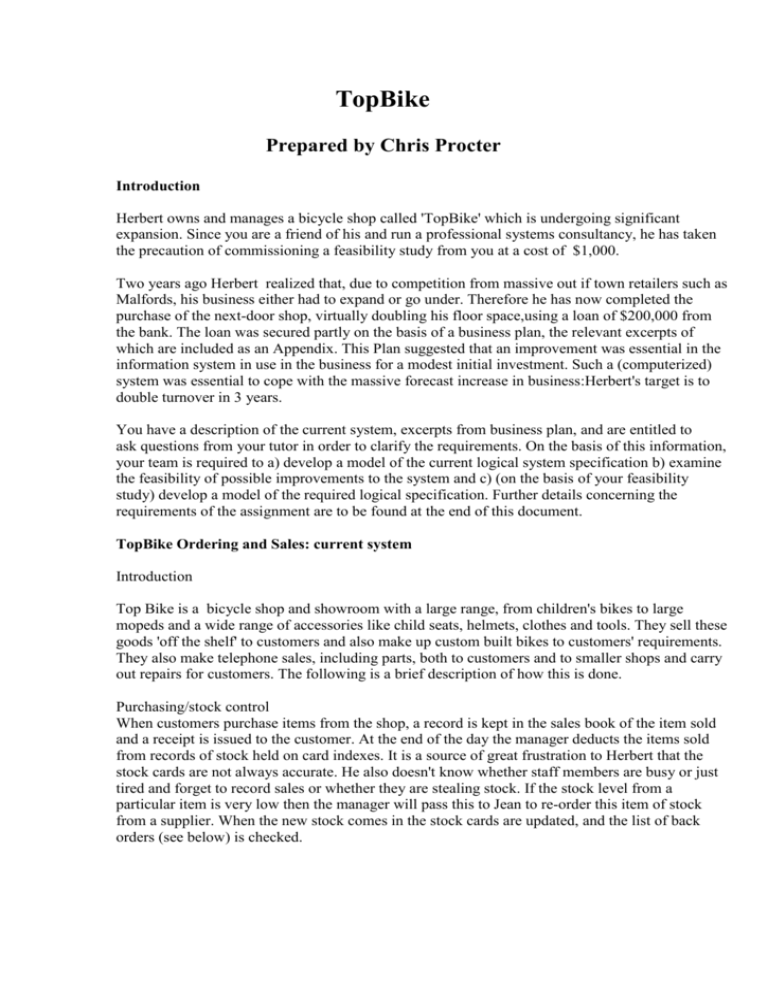
TopBike Prepared by Chris Procter Introduction Herbert owns and manages a bicycle shop called 'TopBike' which is undergoing significant expansion. Since you are a friend of his and run a professional systems consultancy, he has taken the precaution of commissioning a feasibility study from you at a cost of $1,000. Two years ago Herbert realized that, due to competition from massive out if town retailers such as Malfords, his business either had to expand or go under. Therefore he has now completed the purchase of the next-door shop, virtually doubling his floor space,using a loan of $200,000 from the bank. The loan was secured partly on the basis of a business plan, the relevant excerpts of which are included as an Appendix. This Plan suggested that an improvement was essential in the information system in use in the business for a modest initial investment. Such a (computerized) system was essential to cope with the massive forecast increase in business:Herbert's target is to double turnover in 3 years. You have a description of the current system, excerpts from business plan, and are entitled to ask questions from your tutor in order to clarify the requirements. On the basis of this information, your team is required to a) develop a model of the current logical system specification b) examine the feasibility of possible improvements to the system and c) (on the basis of your feasibility study) develop a model of the required logical specification. Further details concerning the requirements of the assignment are to be found at the end of this document. TopBike Ordering and Sales: current system Introduction Top Bike is a bicycle shop and showroom with a large range, from children's bikes to large mopeds and a wide range of accessories like child seats, helmets, clothes and tools. They sell these goods 'off the shelf' to customers and also make up custom built bikes to customers' requirements. They also make telephone sales, including parts, both to customers and to smaller shops and carry out repairs for customers. The following is a brief description of how this is done. Purchasing/stock control When customers purchase items from the shop, a record is kept in the sales book of the item sold and a receipt is issued to the customer. At the end of the day the manager deducts the items sold from records of stock held on card indexes. It is a source of great frustration to Herbert that the stock cards are not always accurate. He also doesn't know whether staff members are busy or just tired and forget to record sales or whether they are stealing stock. If the stock level from a particular item is very low then the manager will pass this to Jean to re-order this item of stock from a supplier. When the new stock comes in the stock cards are updated, and the list of back orders (see below) is checked. Repairs When customers bring in an item for repair, they are quoted a price which is calculated by Herbert or Vijay, who is the chief repairmen, by adding parts + labor + VAT. This quote is recorded in the repairs book, and customers are expected to make payment when they collect the item. Sometimes it is necessary to adjust the quote when a repair job has discovered hidden problems! The repair will involve the use of new parts that also involves altering the stock list/re-ordering. The procedure for custom-built bikes is very similar and record is kept in the custom-built bikes list. Telephone orders Customers (known as Indirect Customers) may make an enquiry by phone, in which case the staff member will consult both the price list (also a manual list) and the stock list. If the price is right and the item is in stock (assuming that the stock list is correct), the customer may place an order. The order is recorded in the telephone orders book. In the morning a designated member of staff (usually Vijay) puts together the appropriate items of stock, if they are available, together with an invoice that is collected and delivered by the company van. If items are in fact unavailable Vijay has to tell Herbert to make re-orders, send a part order, record the part order not completed and phone the customer to apologize. The telephone customer would typically then pay by check. Herbert and Jean (who works in the office) handle the banking. If all part of an order is out of stock (or normally held in stock) then re-order is sent to the suppliers (if one hasn't already been sent). The order is then filed away in a back orders files that is checked when new stock comes in. A record is kept of customers' invoices that is checked monthly. If a customer has failed to pay during the month then a repeat invoice is send to them. If Jean is too busy/forgets/ is on holiday/ sick the repeat invoices are delayed. Currently the business is owed approximately $10,000 by other shops and $10,000 by indirect customers. Herbert blames Jeans' inefficiency for this debts and for his stomach ulcers! Trade customers Other bike shops may also place orders by phone. The only difference in the way their orders is handled to those of other (indirect) customers is that bike shops get a 15% discount who shouldn't be. Staff at TopBike is also entitled to this discount. Unbeknownst to Herbert, Ged has already bought 4 bikes this year! Suppliers' invoices Herbert and Jean also handle all suppliers' invoices which , when received, are checked against orders. Where there is a discrepancy usually Jean will phone the suppliers; otherwise TopBike has a reputation fro paying promptly. New System ideas Ged, who works on the shop counter and is only paid $150 per week, took the first year of a computing course at University but left because he run out of money and failed a couple of modules. He has his own Web site at home and reckons he could easily put together something for the shop. He told Herbert, who is interested, but ignorant about such matters: "...if you invest about $5000 in two PCs (one for the counter and one for the office) and peripherals such as cable, barcode reader, printers etc. which I can hook up together, I can build you a stock control system and a web site in about two months of my own time. You could use the Web to advertise the shop and take orders from customers who're connected. You don't to worry about software, because I have got the latest kit that will do the job easily All you'd need to do then is pay me extra $2500 per year on my salary to develop and manage the system, and an annual fee to an Internet service provider of about $200 per year." Appendix 1: Relevant excerpts of TopBike Business plan as presented to the bank 'Rationale ... TopBike is a bicycle showroom and repair shop. The shop has steadily over the last 10 years and in 1997/8 had a turnover of $400,000. The shop employs 7 staff including the owner and manager Herbert. With the exception of Sally, who is part time and only works Saturdays and occasional other days such Christmas, all the staff is full time. Two of the staff work full time on repairs... In the current economic climate and considering the ongoing influence of macroeconomic entities the business must consider its position via a vis 'out of town developments. It is the view of the directors (in reality Herbert ed.) that the business will either need to significantly expand to a turnover of $800,000 by the year 2000 or collapse. This is Justification for seeking a loan of $200,000 with repayment over a 5-year period. Details of the business plan follow... Name of business: NoAsthma In order to increase revenue, TopBike will reposition itself to take advantage of an increased public interest in leisure, fashion and the environment. It will therefore rename itself 'NoAsthma' and seek to significantly increase sales, particularly in cycle clothing. It will introduce its own range of branded designer clothes, manufactured by a third party. By purchasing additional premises it will double floor space devoting one half to clothing. The measures outlined below are expected to increase turnover by 100% in the space of 3 years... Competition and Suppliers TopBike is concerned about the massive new out of town development, three miles away, in Dumptow, due to open in 1999. 'Malfords', one of Britain's leading cycle retailers, is planning to open a new cut-price superstore there, which could significantly impact on TopBike's trade. TopBike is also concerned that they might lose their position as agent for 'Waleigh'. Waleigh's rep. has indicated to Herbert that TopBike neither generates sufficient revenue for Waleigh to be interested in continuing their current relationship (which involves a special discount on all Waleigh goods), nor does TopBike (unlike Malfords) possess the equipment necessary for electronic trading. It should be noted that Waleigh account for approximately one third of TopBike's sales. The conclusion drawn by the company is that they must expand significantly in order to retain their area status for Waleigh. TopBike currently gets 10% discount on all Waleigh goods as a result of this status. Costs ...From a loan of $200,000, $150,000 will be spent on purchase and refurbishment of the new premises. The remainder is allocated to advertising, development of computerized sales and ordering system, development of an Internet site, some advertising additional to the current budget of $7,000 per year, and new stock. An expert member of staff has estimated that an initial investment of around $5,000 together with an annual operating cost of $2,500 should prove adequate for the computer work... Following the refurbishment of the new premises and introduction of the new systems (3-4 months), TopBike will commence repayments at the rate of $60,000 for 5 years...
